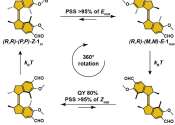New algorithm cuts through 'noisy' data to better predict tipping points
Whether you're trying to predict a climate catastrophe or mental health crisis, mathematics tells us to look for fluctuations.

Whether you're trying to predict a climate catastrophe or mental health crisis, mathematics tells us to look for fluctuations.
Mathematics
20 hours ago
0
140

Light-driven molecular motors were first developed nearly 25 years ago at the University of Groningen, the Netherlands. This resulted in a shared Nobel Prize for Chemistry for Professor Ben Feringa in 2016. However, making ...
Biochemistry
Apr 26, 2024
0
127

Medical implants could fail less often when coated with a microscopically crinkled, ceramic material designed by researchers at the University of Michigan. The coating is described in a paper published in ACS Applied Materials ...
Nanomaterials
Apr 24, 2024
0
2

An international team at the world's largest X-ray laser European XFEL at Schenefeld near Hamburg has scrutinized the properties of an important nanogel that is often used in medicine to release drugs in a targeted and controlled ...
Nanophysics
Apr 19, 2024
0
60

Microscopic chasms forming a sea of conical jagged peaks stipple the surface of a material called black silicon. While it's commonly found in solar cell tech, black silicon also moonlights as a tool for studying the physics ...
General Physics
Apr 16, 2024
0
23

New options for making finely structured soft, flexible and expandable materials called hydrogels have been developed by researchers at Tokyo University of Agriculture and Technology (TUAT).
Nanomaterials
Apr 11, 2024
0
9

In a new breakthrough that could revolutionize medical and material engineering, scientists have developed a first-of-its-kind molecular device that controls the release of multiple small molecules using force.
Polymers
Apr 10, 2024
0
15

Programs and policies that help households go beyond stocking up on food and medical supplies to invest in longer-term protections could overcome the risk perception gap and support adaptation to rising climate-related threats.
Environment
Apr 9, 2024
0
9

From pacemakers to neurostimulators, implantable medical devices rely on batteries to keep the heart on beat and to dampen pain. But batteries eventually run low and require invasive surgeries to replace.
Materials Science
Mar 27, 2024
1
164

This unusual, subterranean mammal with extreme longevity shows genetic adaptations to low oxygen environments which could offer opportunities for advancing other areas of physiological and medical research in humans, including ...
Plants & Animals
Mar 27, 2024
0
77